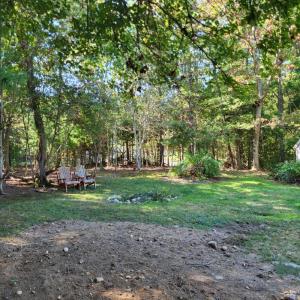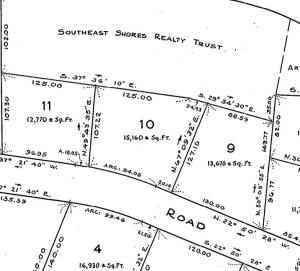From Wareham to the White House and beyond: The chronicle of Brian Atwood
 Brian Atwood, right, sits with Archbishop Desmond Tutu of South Africa. Source: Brian Atwood
Brian Atwood, right, sits with Archbishop Desmond Tutu of South Africa. Source: Brian Atwood Atwood, left, opens the new regional office for USAID with then Botswana President Festus Mogae, middle, and Valerie Dickson Horton, right.
Atwood, left, opens the new regional office for USAID with then Botswana President Festus Mogae, middle, and Valerie Dickson Horton, right. Brian Atwood today.
Brian Atwood today. An old headshot of Atwood.
An old headshot of Atwood. Atwood awards Board Middle School in Quincy, Massachusetts with money from USAID, 1998.
Atwood awards Board Middle School in Quincy, Massachusetts with money from USAID, 1998. Atwood visits Indonesia, June 1996.
Atwood visits Indonesia, June 1996. Atwood and Hillary Clinton at a dedication for Clinton in 1999.
Atwood and Hillary Clinton at a dedication for Clinton in 1999. Atwood, right, meets with former President Jimmy Carter, 1993.
Atwood, right, meets with former President Jimmy Carter, 1993. Atwood and President Carter.
Atwood and President Carter. Atwood in South Africa, Jan. 1996.
Atwood in South Africa, Jan. 1996. Atwood visits South Africa, May of 1996.
Atwood visits South Africa, May of 1996. Atwood on his trip to South Africa, May 1996.
Atwood on his trip to South Africa, May 1996. Atwood visits a South African classroom, Jan. 1996.
Atwood visits a South African classroom, Jan. 1996. Atwood, left, meets with former President Bill Clinton, an official from the United Nations and a former Swedish Prime Minister.
Atwood, left, meets with former President Bill Clinton, an official from the United Nations and a former Swedish Prime Minister. Al Gore, left, and Atwood.
Al Gore, left, and Atwood. Atwood, right, and NBA hall-of-famer Manute Bul.
Atwood, right, and NBA hall-of-famer Manute Bul. Brian Atwood, right, sits with Archbishop Desmond Tutu of South Africa. Source: Brian Atwood
Brian Atwood, right, sits with Archbishop Desmond Tutu of South Africa. Source: Brian Atwood Atwood, left, opens the new regional office for USAID with then Botswana President Festus Mogae, middle, and Valerie Dickson Horton, right.
Atwood, left, opens the new regional office for USAID with then Botswana President Festus Mogae, middle, and Valerie Dickson Horton, right. Brian Atwood today.
Brian Atwood today. An old headshot of Atwood.
An old headshot of Atwood. Atwood awards Board Middle School in Quincy, Massachusetts with money from USAID, 1998.
Atwood awards Board Middle School in Quincy, Massachusetts with money from USAID, 1998. Atwood visits Indonesia, June 1996.
Atwood visits Indonesia, June 1996. Atwood and Hillary Clinton at a dedication for Clinton in 1999.
Atwood and Hillary Clinton at a dedication for Clinton in 1999. Atwood, right, meets with former President Jimmy Carter, 1993.
Atwood, right, meets with former President Jimmy Carter, 1993. Atwood and President Carter.
Atwood and President Carter. Atwood in South Africa, Jan. 1996.
Atwood in South Africa, Jan. 1996. Atwood visits South Africa, May of 1996.
Atwood visits South Africa, May of 1996. Atwood on his trip to South Africa, May 1996.
Atwood on his trip to South Africa, May 1996. Atwood visits a South African classroom, Jan. 1996.
Atwood visits a South African classroom, Jan. 1996. Atwood, left, meets with former President Bill Clinton, an official from the United Nations and a former Swedish Prime Minister.
Atwood, left, meets with former President Bill Clinton, an official from the United Nations and a former Swedish Prime Minister. Al Gore, left, and Atwood.
Al Gore, left, and Atwood. Atwood, right, and NBA hall-of-famer Manute Bul.
Atwood, right, and NBA hall-of-famer Manute Bul.While working in Senegal at 25 years old, Brian Atwood was awakened in the middle of the night and told to rush to the embassy right away — a potential national security emergency needed his attention.
Senegalese officials had found a surveillance bug which Atwood determined belonged to the Soviets. Unsure what might happen next, he asked for a gun in the event the situation escalated.
“I thought I was going to shoot my foot off at one point,” he said. “I was scared stiff.”
Atwood, now 83 years-old, is a Wareham native whose decades-long career in government took him across the world. He has compromised Soviet surveillance missions while working for the National Security Agency, facilitated the removal of two dictators as a member of the National Democratic Institute and helped save tens of millions of lives as the director of the United States Agency for International Development, more commonly known as USAID.
He was also at the organization’s front door when President Donald Trump’s $7.9 billion cut to international aid took effect.
“We were greeting people as they came out with their boxes of personal items and they told me ‘well, you gave us 30 years,’” he said. “It didn’t make me feel all that great.”
However, his journey to Washington D.C. and beyond started in Wareham.
Born in 1942 to a fireman father and dental assistant mother, Atwood said he remembers growing up in a Wareham not so different from today. The population always spiked in the summer and the town was the perfect distance away from Boston.
“There was a place where we’d all go dancing on Saturday nights called ‘The Monday Club,’ which I think is a dentist on High Street now,” he said.
As a student at Wareham High, Atwood began to develop an interest in global politics which grew while studying as an exchange student in the American Field Service Program.
He traveled to the small central European nation of Luxembourg between his junior and senior year of high school. While there, he worked alongside a local teenager who left a lasting impression.
“‘You and the Soviets are just the same,’” Atwood said his friend told him. “I was taken aback and I said ‘my goodness how could you say that I mean we’re a democracy, they’re communist.’ He said ‘yes but you both want to dominate us.’”
“I’ve always remembered that comment and understood what it’s like to be from a small country,” he said. “He was as proud of his country as I was of mine. I learned a lot from that experience and it really did change my life and set me on a path to do a lot internationally.”
Before continuing his career in international politics, Atwood returned home and attended Boston University on a football scholarship, studying Greek literature and how the world worked.
“There was no question about what I wanted to do in life and the recruiters came around from various places and the one that stuck out to me was the National Security Agency,” he said. “I very distinctly remember saying I don’t want to dedicate my life to colgate dental cream or some product. I want to dedicate my life to public service and to governance.”
After two years with the National Security Agency, Atwood got his chance to go back overseas as a regional security officer in Western Africa with the State Department.
“I’m about 25-years-old and I would travel to all of the embassies in West Africa and do a survey on the physical elements of the embassy and a report on what possible threats to the American embassy there were,” he said.
It was in this position he helped thwart the Soviet surveillance mission in Senegal.
“I interviewed a lot of people and when I first arrived at the hotel I got a phone call from someone who said ‘Mr. Atwood,’ I said yes and then they hung up,” Atwood said. “That was clearly the Soviets who were tracking to see whether or not we knew they had been compromised, it was very exciting.”
After his time in Africa, Atwood was transferred to Madrid, Spain and promoted to foreign service officer, working for Richard Nixon’s personal friend Robert C. Hill.
While there, Atwood said he was beginning to feel stuck in his role, until then-Senator Tom Eagleton came to Spain.
Before Eagleton made a name for himself as a vice presidential candidate for George McGovern, he stopped in Madrid to speak at the American embassy. Atwood was tasked with showing Eagleton around the Spanish capital, an opportunity he described as his “big break.”
For five-and-a-half-years Atwood worked on Eagleton's campaign alongside his top advisor, Doug Bennett, who Atwood would befriend and follow in his footsteps.
Bennett became the head of the Office of Congressional Relations and Atwood was his senior deputy. When Bennett left that position and became the head of USAID, Atwood took his place, before eventually replacing Bennett again as the head of USAID in the early 1990s.
“I became an assistant secretary of state at a very young age, I was 31 or 32-years-old,” he said. “It was my second choice to be the head of USAID but it’s the equivalent of deputy secretary of state so it’s a very high ranking position.”
When Atwood entered the position, he began to start his own initiatives in the organization. He started the Office of Transitions Initiative to use the resources now available to him to provide better immediate post-conflict relief.
“What I recognized right away is we did the humanitarian work well and the long term development well but we weren’t prepared for immediate post-conflict situations,” he said.
Following his changes, the agency introduced several new programs, including reconciliation services for countries experiencing civil war and ensuring resources were available for post-war recovery.
“We put people from the Haitian military in classrooms to study computer technology and things like that to make sure they don’t go pick up arms and start the war all over again,” he said. “We financed radio stations that had messages of reconciliation and did a lot of things of that nature.”
But this did not outweigh the organization’s main objective of long term development and avoiding crises around the world.
As director, Atwood played a major role in saving millions lives in Eastern Africa from famine using the organization's satellite system to examine what parts of the world were experiencing drought.
Atwood explained that in the mid 1990s, 20 million people in the area were going to have to find a new place to feed their animals, a problem that would destabilize the region.
“I went to Vice President Al Gore with this information and said ‘look if we don’t do something 20 million people are going to be on the move or they’re going to die,” he said. “So we then took that to President Clinton and that launched the Greater Horn of Africa initiative."
The initiative got Eastern Africa countries who could grow extra food to do so and with the help of USAID, moved it into famished areas.
Now that USAID has been merged with the state department, Atwood said he fears crises such as the famine in Eastern Africa may not be prevented.
“We’re a leader in the world and we can lead in the right direction or the wrong direction,” he said. “The questions are going to be raised as to whether or not we could avoid future losses of life."
This isn’t the first time a push to merge USAID with the state department has been made. At the end of the Cold War in 1991, there was a push to cut USAID and put whatever was left in the state department — which Atwood fought against.
Opposing Atwood’s decision not to let USAID fall to the state department was Senator Jesse Helmes who refused to hold a hearing for Atwood when he was nominated to be the ambassador to Brazil.
“I was in limbo and I couldn’t move so I was eventually forced to retire,” he said.
But even after his time at USAID was over, Atwood’s work continued. He went on to run the National Democratic Institute and helped remove two dictators in the Philippines and Chile.
“Within the span of two years we had gotten rid of two dictators and then the wall came down in central Europe,” he said. “We were all over eastern and central Europe and the Soviet Union.”
Today, Atwood may not be leading any national organizations or fighting international dictators but he is teaching the next generation how countries and governments operate as a professor at Brown University.


























































